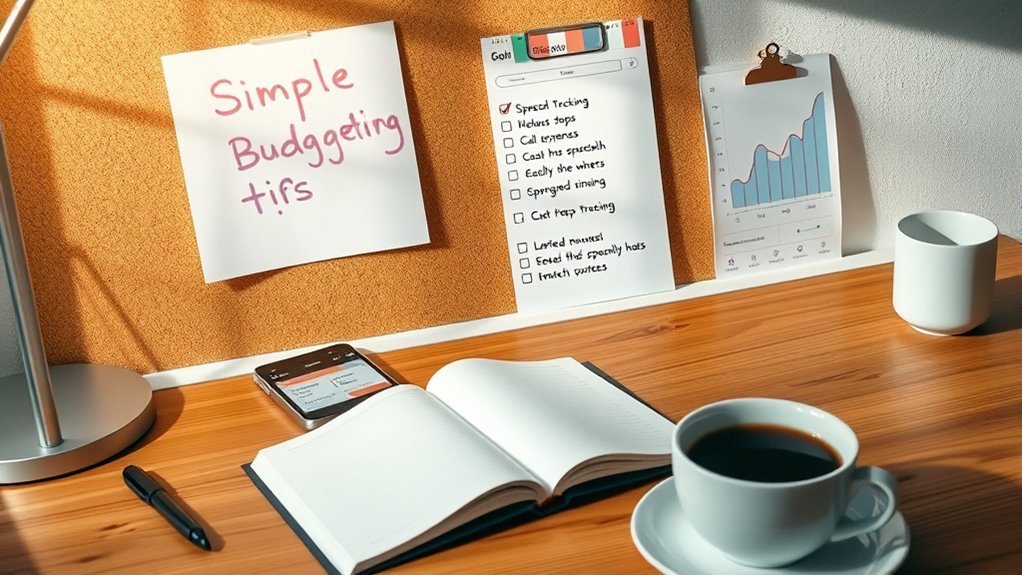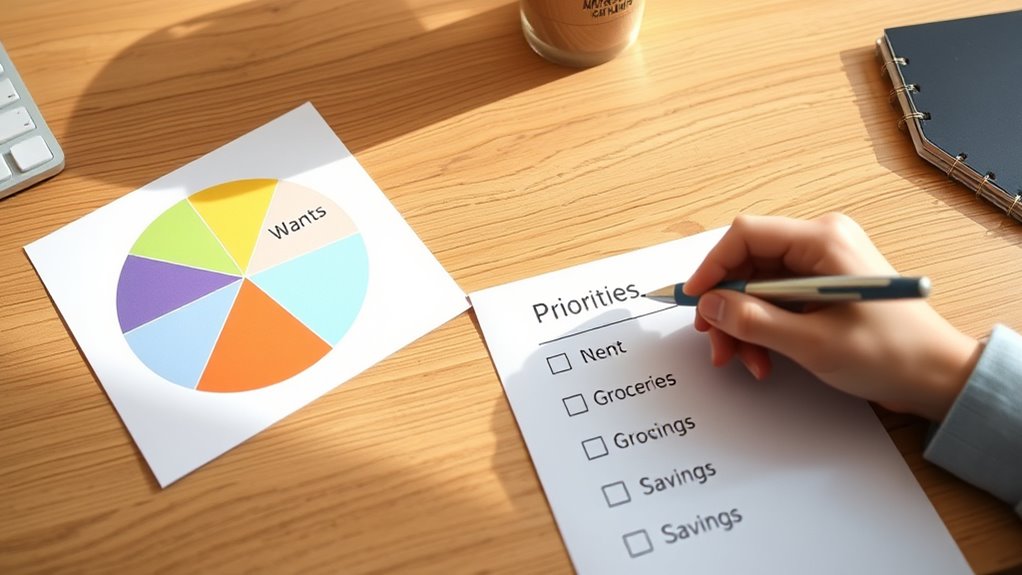To budget simply, start by knowing your income and tracking all your expenses, both essentials and non-essentials. Set clear goals, like saving for an emergency or paying off debt, and break them into smaller steps. Prioritize needs over wants and build an emergency fund before spending on extras. Review and adjust your budget regularly to stay on track. Keep things straightforward, and you’ll find it easier to stay motivated and reach your goals. Keep going to learn more helpful tips.
Key Takeaways
- Track all income and expenses to understand your financial flow and identify areas to save.
- Prioritize essential needs like housing, food, and healthcare before spending on non-essentials.
- Set clear, specific financial goals and break them into small, manageable steps for easier progress.
- Build an emergency fund covering 3-6 months of expenses for unexpected costs.
- Regularly review and adjust your budget to stay aligned with changing financial situations and goals.
Understanding Your Income and Expenses

To create an effective budget, you first need to understand your income and expenses. Track every source of income, from your paycheck to any side gigs, so you know exactly what’s coming in. Next, list all your expenses, including essentials like rent, utilities, and groceries, as well as non-essentials. This helps you identify areas where you might cut back. Understanding your finances also involves considering your investment strategies and how they fit into your budget, ensuring you’re saving for future goals. Proper debt management is vital, so include debt payments in your expenses and aim to prioritize high-interest debts. By gaining clarity on your income and expenses, you set a solid foundation to build a budget that works for your financial situation.
Setting Clear Financial Goals

Once you’ve mapped out your income and expenses, the next step is to set clear financial goals. Having specific goals helps you stay focused and motivated, whether you’re saving for a big purchase, paying off debt, or building an emergency fund. Improving your financial literacy is key to understanding how different strategies can help you reach these goals. For example, learning about basic investment strategies can boost your savings over time. Set SMART goals—specific, measurable, achievable, relevant, and time-bound—to give your plans structure. Write them down and review them regularly. Regularly reviewing your goals ensures you stay aligned with your progress and can make adjustments as needed. Clear goals turn abstract dreams into actionable steps, making it easier to stay disciplined and make informed decisions about your money.
Tracking Your Spending

To stay on top of your finances, start keeping a spending journal to record every expense. Reviewing your monthly expenses helps you spot patterns and identify areas where you can cut back. This simple step makes it easier to stick to your budget and reach your financial goals. Incorporating regular assessments of your spending habits can further enhance your budgeting effectiveness.
Use Spending Journals
Have you ever wondered where your money truly goes each month? Using a spending journal helps you uncover that. By recording every expense, you get clear insight into your spending habits. Focus on:
- Receipt organization: Keep all receipts in one place to avoid missed expenses.
- Expense categorization: Group similar costs, like groceries or entertainment, for easier analysis.
- Tracking patterns: Notice recurring costs that may be draining your budget without your awareness.
A spending journal helps you identify unnecessary expenses and better manage your money. It’s not just about tallying totals but understanding your financial habits. When you actively categorize expenses and organize receipts, you gain control over your spending, making it easier to stick to your budget and save more effectively.
Review Monthly Expenses
After you’ve started tracking your expenses with a spending journal, reviewing your monthly expenses becomes the next essential step. Take time to analyze where your money goes each month, including fixed costs and variable expenses. This helps you identify areas where you can cut back and improve credit card management to avoid unnecessary interest charges. If you notice high balances or mounting debt, consider debt consolidation options to simplify payments and reduce interest rates. By understanding your spending habits, you can create a more realistic budget and prioritize savings. Regular reviews also help you stay accountable and make adjustments as your financial situation changes, ensuring you maintain control over your finances and work toward your financial goals. Additionally, being aware of bank opening hours can help you plan your financial activities more effectively, especially when dealing with branches during limited hours.
Creating a Realistic Budget Plan

Creating a realistic budget plan starts with understanding your actual income and expenses. Once you know what’s coming in and going out, you can set achievable financial goals. Focus on incorporating savings strategies and debt reduction into your plan. To do this effectively, consider these points:
- Track your spending to identify areas where you can cut back.
- Allocate a portion of your income to savings before covering expenses.
- Prioritize paying off high-interest debt to free up future funds.
- Using eye patch benefits can be a helpful analogy for protecting your financial health by managing spending habits carefully.
Prioritizing Needs Over Wants

To manage your finances effectively, it’s essential to prioritize needs over wants. Recognize the difference between necessity versus luxury—focus on essentials like housing, food, and healthcare first. Impulse control plays a key role here; resist the urge to splurge on non-essential items that can derail your budget. Before making a purchase, ask yourself if it’s a genuine need or just a fleeting desire. If it’s a want, consider delaying the purchase to see if the urge passes. This mindset helps you allocate your money wisely, ensuring your basic needs are covered before indulging in extras. Being aware of financial priorities allows you to make smarter choices and stay on track with your financial goals. By consciously prioritizing needs, you build a solid foundation for financial stability and avoid unnecessary debt.
Building an Emergency Fund

Prioritizing your needs over wants helps you stay financially stable, but it’s equally important to prepare for unexpected expenses. Building an emergency fund ensures you’re ready for surprises like medical bills or car repairs. Start small by saving a portion of your income regularly. Consider different insurance options to protect against costly emergencies. Look into simple investment strategies that can grow your fund over time. Remember, your emergency fund should cover at least three to six months of living expenses. Juice cleansing is a good example of a health-related approach that requires planning and financial preparation to support your wellness goals. Keep these points in mind:
Build an emergency fund with consistent savings, insurance, and investments for unexpected expenses.
- Save consistently, no matter how small
- Diversify with insurance options and investments
- Keep your fund accessible but separate from daily spending
This approach helps you stay prepared and reduces financial stress during unforeseen events.
Reviewing and Adjusting Your Budget Regularly

Have you ever wondered if your budget still works for your current financial situation? Regularly reviewing your budget is essential to stay on track. Life changes, so your expenses and income might shift over time. This is when cost adjustment becomes necessary; perhaps your rent increased or your income grew. Seasonal planning helps you anticipate these changes—like higher holiday spending or summer vacations—so you can allocate funds accordingly. Set aside time monthly or quarterly to analyze your spending habits and compare them to your goals. Adjustments might include cutting back on non-essentials or reallocating funds to savings. Staying proactive ensures your budget remains relevant, helping you manage your money effectively and avoid surprises. Additionally, understanding Gold IRA options can diversify your retirement planning strategies and provide financial security in the long term.
Staying Motivated and Consistent

To stay motivated and consistent, you need clear goals that give you direction. Tracking your progress helps you see how far you’ve come and keeps you focused. Celebrate small wins along the way to stay inspired and committed to your budgeting journey. Incorporating simple budgeting tips can further streamline your efforts and enhance your financial discipline.
Set Clear Goals
Setting clear goals is essential for staying motivated and consistent with your budget. When you define specific targets, like building an emergency fund, reducing debt, or saving for a big purchase, you give yourself direction. Clear goals help you choose effective savings strategies and stay focused on debt reduction. To deepen your understanding, consider these:
- Prioritize goals that motivate you most, keeping your momentum high.
- Break large goals into smaller, manageable milestones to track progress.
- Regularly revisit and adjust goals to stay aligned with your evolving financial situation.
- Understanding the cost of electric bikes can help you make informed decisions when budgeting for a new bike.
Track Progress Regularly
Why is it important to track your progress regularly? Keeping an eye on your budget helps you stay motivated and on track. Using financial apps makes this easier—they often have visual charts that give you a clear picture of your spending and savings. Regularly updating these charts shows you how well you’re sticking to your goals and highlights areas where you might need to cut back. It’s a simple way to see your progress in real time, which boosts your confidence and keeps you engaged. By making tracking a routine, you develop habits that support your financial health. Remember, consistency is key. The more often you check your progress, the more motivated you’ll be to stay disciplined and reach your financial goals.
Reward Small Wins
Celebrating small wins keeps you motivated and makes sticking to your budget feel rewarding. Acknowledging progress, no matter how minor, reinforces positive habits and helps you stay focused. Celebrating milestones along the way reminds you that your efforts are paying off. To keep momentum, consider these strategies:
- Treat yourself for reaching a savings goal, like enjoying a favorite coffee.
- Share your achievements with friends or family for encouragement.
- Set new, achievable targets to maintain a sense of accomplishment.
Frequently Asked Questions
How Can I Stick to My Budget During Unexpected Expenses?
When unexpected expenses hit, you can stick to your budget by relying on your emergency fund, which acts as a financial buffer. Prioritize your expenses by distinguishing between essential and non-essential costs, ensuring urgent needs are covered first. Adjust your budget temporarily, cutting back on discretionary spending. This approach helps you manage surprises without derailing your overall financial plan, keeping you on track during tough times.
What Are Simple Tools to Help Me Track My Spending?
A penny saved is a penny earned, so tracking your spending matters. To do this easily, try using a cash envelope system where you allocate cash for categories, or turn to mobile budgeting apps that sync with your bank. These tools give you real-time updates, helping you stay on top of expenses and stick to your budget effortlessly. With these simple tools, managing your money becomes a lot less stressful.
How Often Should I Review and Adjust My Budget?
You should review your budget monthly to stay on track and make timely adjustments. Regular monthly reviews help you identify overspending and areas to cut back. Adjust your budget as needed, especially if your income or expenses change. Stick to a consistent adjustment frequency, so your budget remains realistic and effective. This routine keeps you aware of your financial situation and helps you reach your savings and spending goals more easily.
What Are Common Mistakes to Avoid in Budgeting?
Like da Vinci avoiding missed strokes, steer clear of common budgeting mistakes. Don’t overlook your savings strategies, which can derail debt reduction efforts. Avoid impulse spending, underestimate expenses, or neglect to track income. Overspending on non-essentials can undo progress, while ignoring irregular costs hampers planning. Stay disciplined, review regularly, and adjust accordingly. These habits help you stay on course, turning financial chaos into clarity and control.
How Can I Save More Without Feeling Deprived?
You can save more without feeling deprived by exploring effective savings strategies and focusing on expense reduction. Start by setting realistic goals and automating your savings so it feels effortless. Cut back on non-essential spending and look for small ways to reduce expenses, like switching to cheaper options or limiting dining out. Remember, it’s about balancing your needs and wants, making gradual adjustments that add up over time.
Conclusion
By balancing budgets with bravery, you’ll build confidence and clarity in your cash flow. Consistently track, tweak, and trust your tactics to turn financial fears into freedom. Remember, small steps lead to significant savings, so stay steady, stay motivated, and master your money. With mindful management and a motivated mindset, you’ll make your financial goals not just a dream, but a doable, delightful reality. Start today and see your savings soar!









